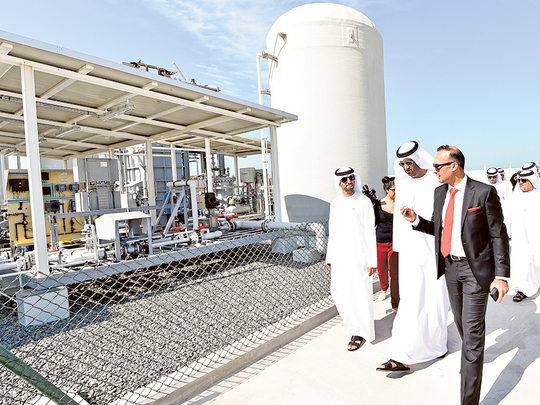
Abu Dhabi: Masdar unveiled four small-scale desalination plants at Ghantoot on the Dubai border on Monday to ultimately be powered using only solar energy.
As part of an 18-month renewable energy desalination regimen, three reverse osmosis plants and a single forward osmosis plant will aim to reduce potable water production costs by 40 per cent, said officials.
All four plants now operational are located on the site of a decommissioned desalination plant with access to deep seawater, officials said.
Reverse osmosis removes seawater by pushing seawater through a membrane filter while forward osmosis works in reverse by pulling seawater through the membrane to produce fresh water. Latest membrane developments coupled with solar energy power could produce 10 to 20 per cent more fresh water at the test plants, said officials.
Huddled under a marquee tent, Masdar leaders and chief executives of its corporate partners said the trial project will take a longer view to scale up the technology to a full commercial plant by 2020.
Through a competitive tender process by Masdar, commercial partners Abengoa, Suez Environnement, Sidem/Veolia and Trevi Systems were selected to develop and operate the plants.
The project is part of Masdar’s renewable energy desalination programme launched in 2013 and funded by the Abu Dhabi government.
“Developing innovative technologies that can sustainably source clean water is vital, not only for the UAE, but for the Gulf and many other regions of the world. With this programme, the UAE is actively and responsibly addressing the challenges of water conservation, management and security,” said Dr Sultan Al Jaber, Minister of State and Chairman of Masdar.
Masdar CEO Dr Ahmad Belhoul told a large gathering that the hunt for innovative efficiencies is critical to reduce the carbon footprint. As much as 98 per cent of potable water is produced in the UAE by desalination, an energy-intensive process where seawater is drawn through membranes to filter out brine.
“Not only are we funding new technology but we are also testing it and deploying it,” Dr Belhoul said. “By using solar power, we are cutting the carbon footprint to zero.”
The new pilot project’s four test desalination plants will produce roughly 1,500 cubic metres per day, in addition to the 916 million imperial gallons that flow through existing desalination plants every day in Abu Dhabi.
Carlos Cosin, chief executive officer of Abengoa’s water division, said: “We are committed to solving water scarcity problems in the Middle East and for this reason we are mobilising our efforts in the direction of developing innovative technologies so that the earth´s inhabitants have access to quality water.”
John Wesley, CEO of Trevi Systems, noted the “installation marks an important milestone in the development and deployment of forward osmosis technology, which will enable renewable desalination to be deployed in the Gulf and elsewhere”.
Jean-Louis Chaussade, CEO of Suez, said his firm “is proud to play an active role in the Masdar Seawater Desalination Programme and to contribute to Masdar’s ambitious initiatives for renewable energy”.
BOX
Fast facts
• In the UAE, seawater desalination requires ten times more energy than surface fresh water production and demand for fresh water is projected to grow by 30 per cent in the UAE by 2030
• An estimated annual cost savings of $94 million (Dh345.28 million) is expected from 2020 onwards, if 15 per cent of Abu Dhabi’s newly built desalination capacity is met by the implementation of the demonstrated energy efficient technologies
• It takes roughly two litres of seawater to produce one litre of fresh water
• The average home uses one cubic metre of water per day
• The Gulf region accounts for around 40 per cent of the world’s desalinated water production.
Source: Masdar












